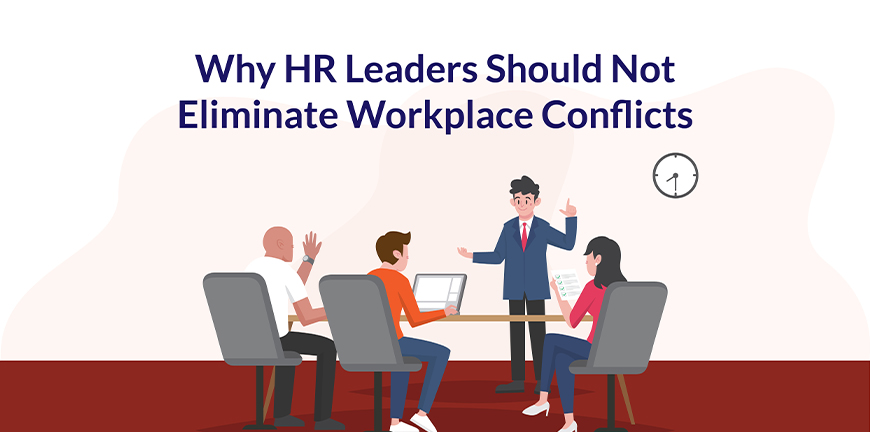
Why is Long Job Tenure Largely Detrimental New
11/04/2023
The Toxicity of Hustle Culture and How to Avoid It
11/04/2023Human resource management is essential for the proper functioning of any association, regardless of its strength. Most people do not understand the importance of the role of HR, especially when it comes to the resolution of conflicts. The HR management team applies conflict resolution skills to help people understand the differences between them do not hinder the work process but enrich the team and give it more strength.
A wise HR manager ensures that he always has an eye on the team to prevent conflicts before they even happen. To achieve this, an HR has to have a deep understanding of human relationships and a keen eye for detail. They need to create an atmosphere of trust wherein people feel safe and comfortable discussing their problems.
HR professionals should adopt an unbiased attitude before taking on the conflict-handling process to unlock the real reasons behind the conflict in sight.
Is it necessary to prevent conflict? Is a workplace conflict always unproductive?
The word “Conflict” has a lot of negative implications around it, but it is not something you need to avoid. Engaging in productive conflict is essential to thriving in a workplace environment. In a collaborative environment, a dispute can bring unexpected, positive results to the organization. In addition, healthy workplace conflicts and respectful disagreements can lead to better business growth and productivity.
Standardizing team conflict is essential because it is bound to happen at a certain point. Eliminating workplace conflicts is not practical nor healthy for the growth of an organization. Stifling conflicts makes employees uncomfortable bringing up concerns, stopping the workplace from being an environment of open communication and sharing.
What is productive conflict?
A productive conflict is more of a healthy debate. It is an exchange of different ideas among employees wherein employees feel comfortable voicing their opinions as they are respected. And the most significant incentive is that these kinds of conflicts foster good relationships rather than destroy them. Debates, competition and industry tumult are all examples of productive conflict that can lead to a growth of a business.
Why is productive conflict essential for the growth of a business?
Productive conflict should be encouraged and not suppressed, as it carries several potential advantages that can benefit your organization. Some of those benefits are-
- Forces discomfort and unlock new potential
Conflict brings discomfort among employees, forcing them to get out of their comfort zone and think differently to unlock their potential. Uncomfortable situations ensure that you constantly improve and iterate on practices, technologies and solutions for clients. By actively engaging in productive conflict, you learn to respect the differences of opinions, communicate, and reframe your thoughts, so you can keep advancing and open your eyes to new ideas.
-
Fosters creativity
Conflict, sometimes, introduces a new way of thinking. Consider this scenario- a team member enters into a disagreement with your superior, leading to considering a new way to resolve the problem. Sometimes, a new hire may think they can offer impressive ideas to contribute to the solution. After some back and forth, with the myriad of ideas at your disposal, it’s easier for you eventually arrive at a desirable solution.
As a result, not only did you find a way to help your business save money and potentially make more profit, but helped in boosting your company’s culture, eliminate bias and hierarchy, and giving equal opportunity to everyone to contribute to the solution.
-
Alerts the need for better guidelines
When an organization’s goals and processes are unclear, employees tend to believe and assume their way is right. This lack of clarity can lead to chaos and confusion but if addressed on time, can spark positive changes as the need for clarification of expectations and streamlining procedures arises and helps create better productivity.
-
Encourages healthy debate
Rather than being complacent, productive conflict promotes healthy discourse among team members, contributing to a company culture of open dialogue and discussion. Skilled, talented employees should be able to challenge each other’s thinking and engage in a debate. Listening to all sides of arguments and points can make it easier to derive a constructive solution.
-
Produces innovative solutions
Conflict can introduce new solutions to time-tested problems. For example, if your company is dealing with a product design defect and cannot proceed with product manufacturing, the design team brainstorms ideas to help resolve the issue. While all the suppositions presented by the team members may be helpful, you earn the advantage of choosing and adding what you need to produce the perfect solution and proceed with the manufacturing as planned.
Sometimes, conflict is the only way to solve stubborn problems, as you need to think outside the box and arrive at innovative solutions.
How can an HR leader use and channel conflicts into productive solutions?
How you handle and manage conflict in the workplace is the key to achieving unmatched productivity.
Following are some pointers to help deal with conflicts in the workplace effectively and turn them into solutions-
-
Stay solution focused
For a productive conflict, the first order of business is to find common ground. Stay focused on the disagreement, and don’t single out one person. Refrain from playing the blame game. It’s easy for conflicted situations to become overly emotional and personal and spiral out of control. Re-guide the discussion back to track if it is getting destructive. Remember, the priority is finding the solution and not winning the argument.
-
Listen to the problem and allow them to express their views
For a conflict to result in a solution that all team members are happy with, everyone has to participate. Make sure that you consider everybody’s views, and do not discard anybody’s opinions, even if you disagree. Just listen and acknowledge what they say. Sometimes, one team member’s ideas can be the key to resolving the real problem. So, make sure you listen. And listen to understand.
-
Control your emotions
When a conflict presents itself, it is natural that you would be operating high on emotions and personal opinions. But do not get carried away. Make sure you stay calm and in control of your actions. Do not let emotional and impulsive responses drive the discussion. Stay focused on finding the solution, as behaviour based purely on emotions is usually never in the best interest of everyone.
-
Respect the difference in ideas
Make sure you respect the difference of opinions among your peers. Because if you fail to do that, the disagreement will never progress towards a solution. Reframe your thoughts, pay attention and listen to their suggestions. Create a culture of acceptance by inviting input from employees with different backgrounds. Accepting diverse opinions leads to the growth of new ideas and fosters productivity.
Final Comments
Conflict within the workplace should not be avoided but welcomed. The differences between its members strengthen the team. Avoiding all conflicts may prevent employees from growing and reaching their full potential. Embracing productive conflict can boost your working relationships, and when handled respectfully, it provides an opportunity for growth and fetches outstanding results.
Contact Us For Business Enquiry

Rajkumar Shanmugam
Rajkumar Shanmugam is the Head of HR at ALP Consulting, bringing over 19 years of comprehensive HR leadership experience across India and international markets. His expertise spans talent acquisition, employee relations, performance management, compliance, and HR transformation. Rajkumar has a proven track record of driving people-centric initiatives, enhancing workplace culture, and aligning HR strategy with business goals. With extensive experience in US staffing operations and global mobility, he continues to lead organizational excellence through innovation and employee engagement.




